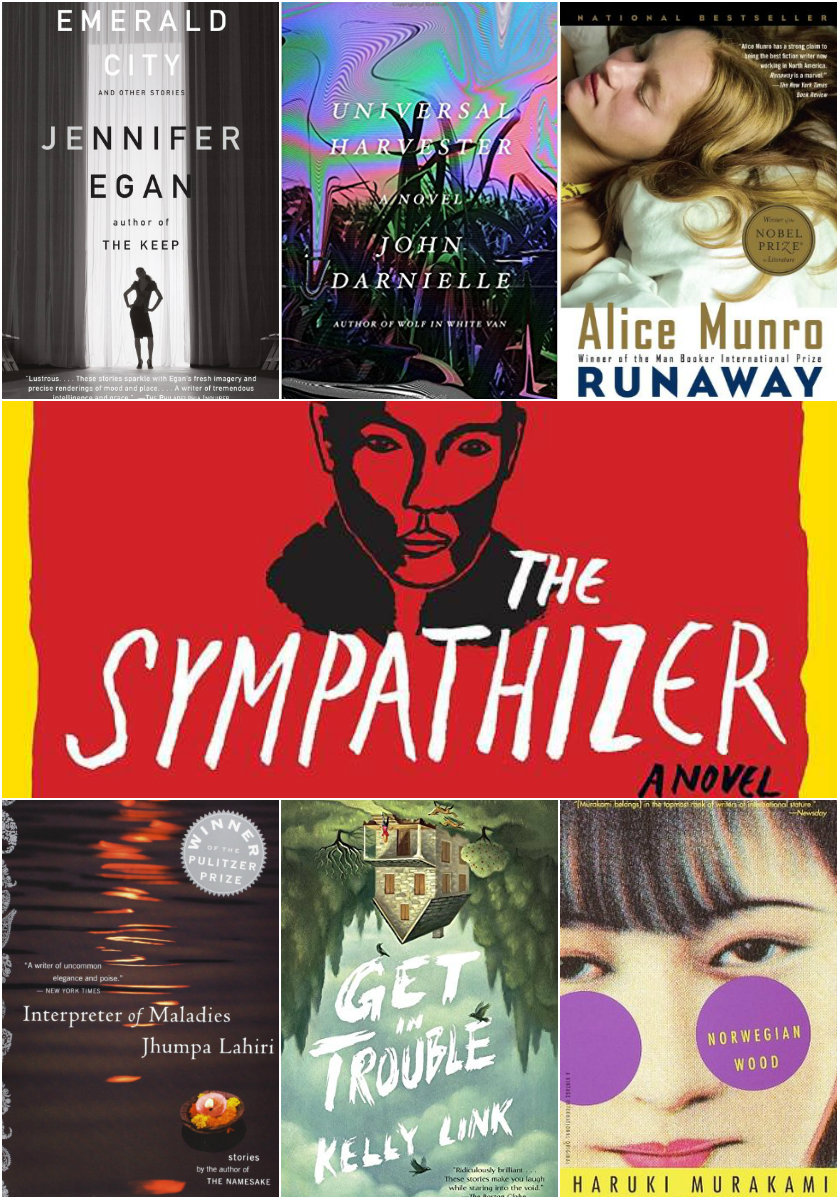
June-July fiction roundup! 7 books this time (so bear with the length): Emerald City, Universal Harvester, The Sympathizer, Interpreter of Maladies, Get in Trouble, Norwegian Wood, Runaway. Now with quotes and film pairings, because why the hell not.
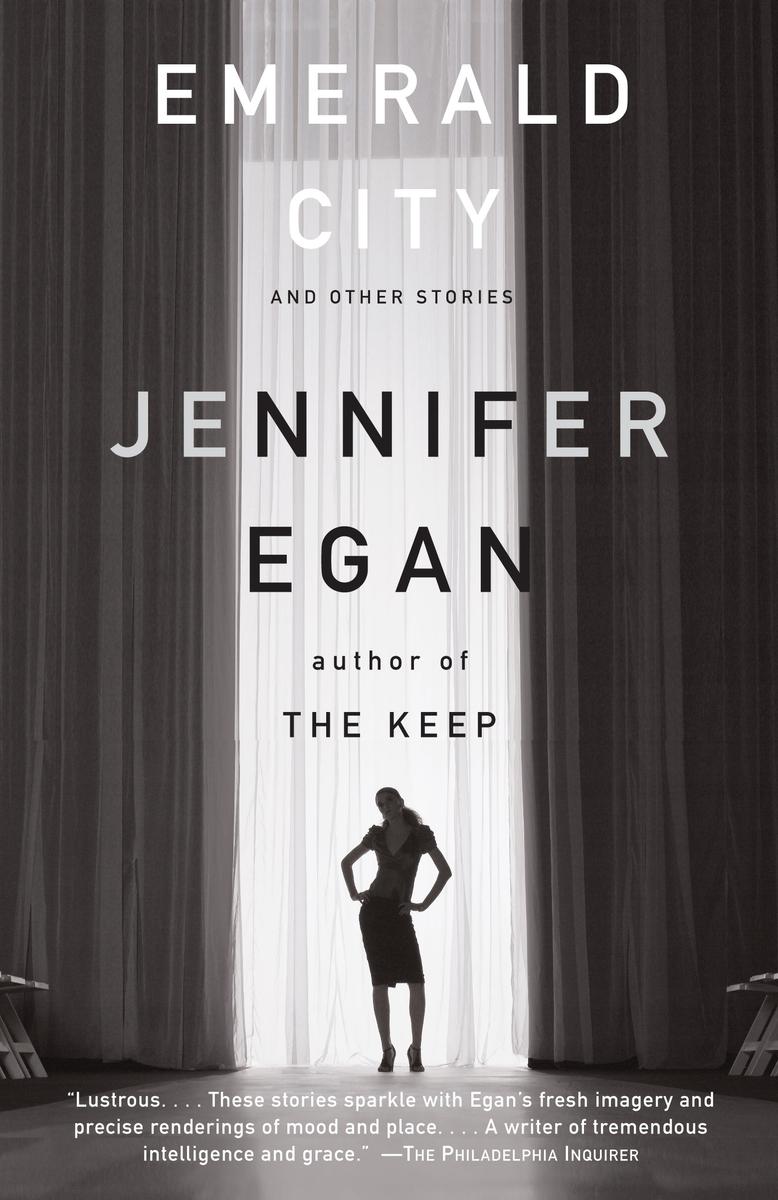
I love Jennifer Egan’s writing, and I can’t explain why. Like many authors on this list, she has a knack for voicing emotional truths; but there’s a certain balance to it, an empathizing-but-never-wholly-complicit tone that absolutely draws me in. Emerald City (3.5/5), her earliest publication (and only proper short story collection), isn’t quite as refined as A Visit from the Goon Squad, but there’s something alluring about those rough edges. Her stories revolve around hurting people on the verge of liberation — glitzy fashion photographers, hedge fund managers, daughters coping with their parents’ failures. It’s not a major work, but each tiny arc of hurt and redemption felt cleansing, exhilarating.
- Film pairing: Francis Ha or Listen Up Philip
- Quote: “He searched the dark shopfronts for something, some final thing at the core of everything else, but he found just his own reflection and Stacey’s. Their eyes met in the glass, then flicked away. And it struck him that this was New York: a place that glittered from a distance even when you reached it.”
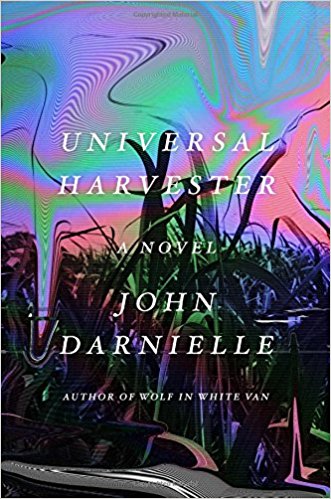
John Darnielle is another author whose diction alone captivates me, with or without an accompanying plot. Universal Harvester (3.5/5), like Wolf in White Van or any given Mountain Goats song, isn’t showy: it’s content to strike a wistful, plodding, lyrical tone and float from page to page. Where Wolf was a fairly straightforward tragedy, Harvester is more difficult to pin down; a moody piece about loss, and the way familiar places, devoid of context, might eventually haunt or consume you. Don’t let the “horror” or “mystery” synopses fool you. This is less a narrative than a folk tale; less about horror than dread, and less about dread than the cathartic letting go thereof. I particularly loved his blending of abstract concepts with physical space, and his empathetic narrator who pauses to dissect the story.
- Film pairing: Personal Shopper or A Ghost Story.
- Quote: “The highway abutting the fields is miraculously uniform for miles on end; this is true on both the east-west and the north-south routes. Are they separate fields on either side of the highway, or does the road mark an artificial division through a single, uniform field? It’s a stupid question, because it only matters to whoever owns the land, but you get all kinds of thoughts when the sun’s strobe-lighting through the driver’s side window all day; and if you let yourself start thinking about the field without the highway, something happens to the way you take in the land. Your inner vision shifts. You think about fields with no one to see them, all that quiet life continuing on with no purpose beyond self-propagation. Tassels rotting in October. It gets to you, if you let it.”
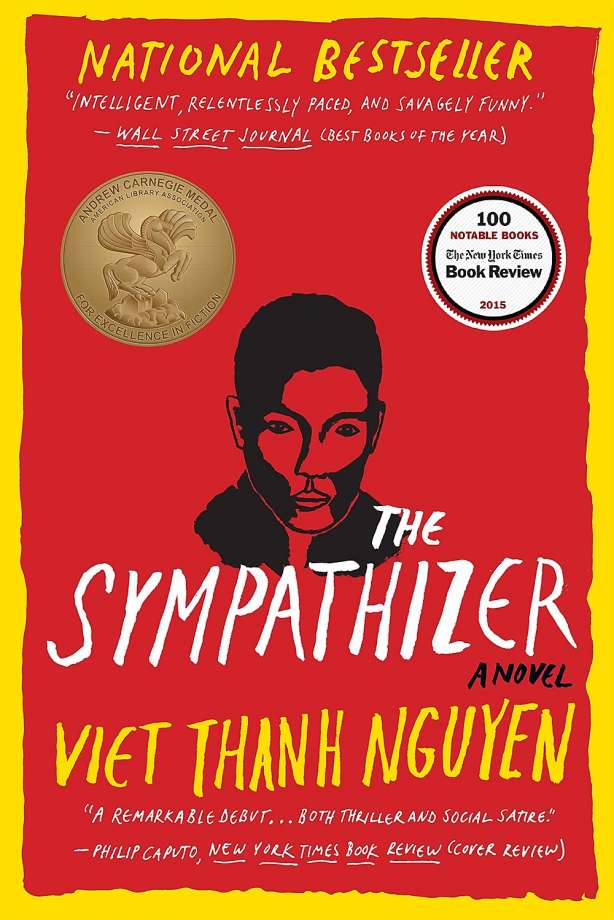
Viet Thanh Nguyen’s The Sympathizer (4.5/5) is an outlier in pretty much every respect on this list. Where other stories are personal, his is sprawling; where other narrators are emotional and confessing, his is duplicitous, coy, and self-consciously clever. It took me a couple hours to click with this book, but once I did it was virtually impossible to put down. The way the narrative conceit unfolds over time, and the joy of constantly playing chess with the narrator, reminded me a bit of David Foster Wallace’s “Good Old Neon” — that is, either delightful or infuriating depending on your mood. I loved seeing the Vietnam War unfold from such a different perspective, and particularly Nguyen’s take on the immigrant experience — offset with just enough wit and sarcasm to keep the darkness in check.
- Film pairing: Apocalypse Now, with biting irony.
- Quote: “I pitied the French for their naïveté in believing they had to visit a country in order to exploit it. Hollywood was much more efficient, imagining the countries it wanted to exploit. I was maddened by my helplessness before the Auteur’s imagination and machinations. His arrogance marked something new in the world, for this was the first war where the losers would write history instead of the victors, courtesy of the most efficient propaganda machine ever created (with all due respect to Joseph Goebbels and the Nazis, who never achieved global domination). Hollywood’s high priests understood innately the observation of Milton’s Satan, that it was better to rule in Hell than serve in Heaven, better to be a villain, loser, or antihero than virtuous extra, so long as one commanded the bright lights of center stage. In this forthcoming Hollywood trompe l’oeil, all the Vietnamese of any side would come out poorly, herded into the roles of the poor, the innocent, the evil, or the corrupt. Our fate was not to be merely mute; we were to be struck dumb.”
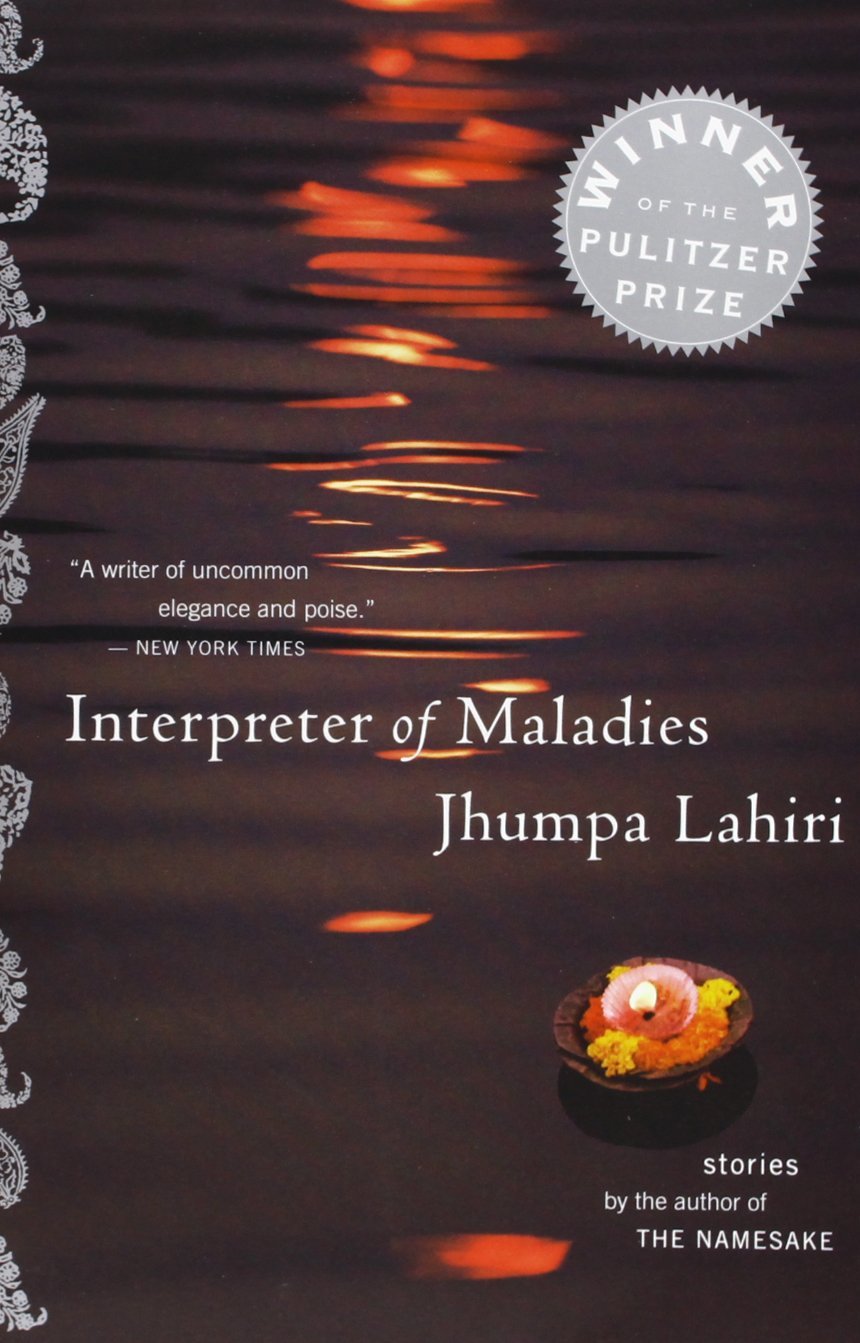
Another book about the immigrant experience, on the polar opposite end of the emotional spectrum: Jhumpa Lahiri’s Interpreter of Maladies (5/5). I adored this short story collection in the most uncool way possible. To my tastes, it’s about as close to perfect as the form can get: each character is presented and laid bare with deft pacing and incredible tenderness. Maybe it was the time and place (having read this entirely on airplanes at night), but I struggle to remember a time such small moments have moved me so much. Each piece was lovely, but my favorite was the first: a story about a couple who turn their nightly power outage into a tiny therapy session.
- Film pairing: Museum Hours or The Lunch Box. But the real pairing I couldn’t shake was a line from the Mountain Goats’ “There Will Be No Divorce”: “We were rising from the grave”
- Quote: “When I saw it that night, as he wound it and arranged it on the coffee table, an uneasiness possessed me; life, I realized, was being lived in Dacca first. I imagined Mr. Pirzada’s daughters rising from sleep, tying ribbons in their hair, anticipating breakfast, preparing for school. Our meals, our actions, were only a shadow of what had already happened there, a lagging ghost of where Mr. Pirzada really belonged.”
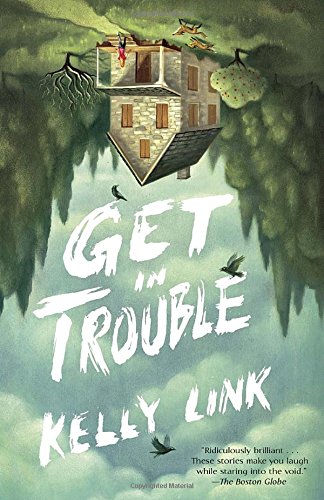
Kelly Link’s Get In Trouble (4/5) shows that there’s more than one way to skin a cat; more than one way to tease out the emotional core. If Lahiri is a gentle therapy session, Link is electroshock treatment, using bizarre and intensely creative plot points to reveal something universal and small. Murakami on Adderall. A stripper pines for a superhero; a girl falls in love with a mail-order ghost; a woman with two shadows drinks away her loneliness till a pocket universe pulls her away. It’s hard to explain why this works — why this never feels like Creative Writing 101 — but it really, really does. My two favorite stories, “I Can See Right Through You” and “The Lesson”, arguably have no fantastical elements at all. But they never feel out of place: fantasy, in Link’s world, is always overshadowed by the mystery of daily life.
- Film pairing: Amélie or Big Fish.
- Quote: “Days go by. Months go by. Years. Sometimes Thanh remembers Bad Claw, the procession of wedding dresses, the caterers, the boat coming toward the island. The place where he picked up a pebble. Sometimes Thanh wonders. Was this it, the thing that he had wished for, even as he had tried to wish for nothing at all? Was it this moment? Or was it this? Or this. Brief joys. The shadow of the valley of the shadow. Even here, even here, he wondered. Perhaps it was.”

When I compare Kelly Link to Murakami, I’m talking about magical realism. Which is precisely what Norwegian Wood (3.5/5) isn’t: this is by far the most straightforward, soulful work of his I’ve read. Even without his fantastical tricks, though, it might be the purest distillation of his voice. Most of that is a complement: this is a wistful, romantic, achingly simple story which breezes by in a way few novels could. Its best passages are better than anything I’ve read of his, particularly when dealing with grief and loss. But it also includes his most predictable cliches: name-dropping classical music junkies, manic Pixie dream girls who exist only to fall in love with (or be saved by) the protagonist, and an indulgent eroticism which borders on voyeurism. That blending of high and low, of course, is exactly what makes him such a joy to read. But with a story this simple, this lovely, I couldn’t help but wish he’d shown more restraint.
- Film pairing: Me and Earl and the Dying Girl or Tumbledown
- Quote: “I tried hard to forget, but there remained inside me a vague knot-of-air kind of thing. And as time went by, the knot began to take on a clear and simple form, a form that I am able to put into words, like this: Death exists, not as the opposite but as a part of life. Translated into words, it’s a cliché, but at the time I felt it not as words but as that knot of air inside me. Death exists—in a paperweight, in four red and white balls on a billiard table—and we go on living and breathing it into our lungs like fine dust.”
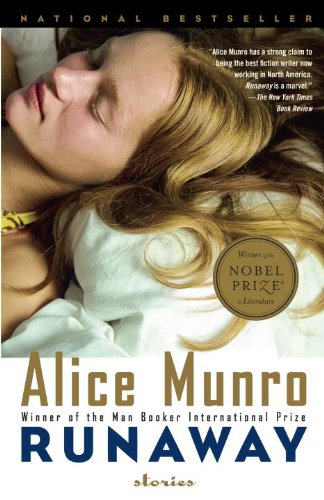
Alicia Munro’s Runaway (4.5/5) showcases exactly that restraint: each character reveals precisely as much of themselves as they mean to, precisely when they should. This collection is like a hot cup of tea by the fire: warm, nourishing, simple. With its stories of women on the brink of emotional escape, it’s tempting to draw parallels to Jennifer Egan. But where Egan is dazzling and showy, Munro is content to slow down and enjoy watching the scenery change. Give it time, she says with a hush. Leave space for it to sink in. I loved how she infuses her writing with a distinct voices and points of view. She tells each story exactly as her characters might tell it; or would, if they could somehow find the words. My personal highlight was three connected stories about a girl named Juliet.
- Film pairing: Before Sunrise, for two very specific reasons. Or, I assume, Almodovar’s Julieta — which he based on Juliet.
- Quote: “What was Grace really looking for when she had undertaken this expedition? Maybe the worst thing would have been to get just what she might have thought she was after. Sheltering roof, screened windows, the lake in front, the stand of maple and cedar and balm of Gilead trees behind. Perfect preservation, the past intact, when nothing of the kind could be said of herself. To find something so diminished, still existing but made irrelevant—as the Travers house now seemed to be, with its added dormer windows, its startling blue paint—might be less hurtful in the long run.”